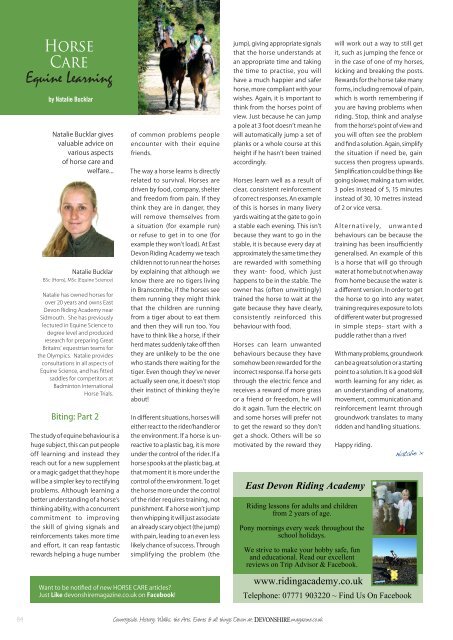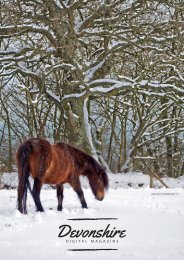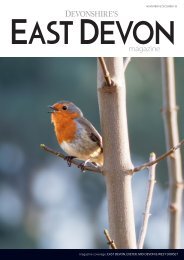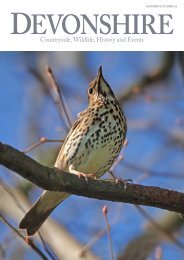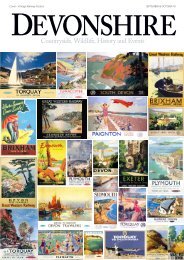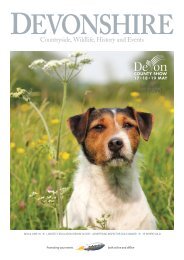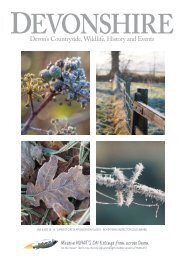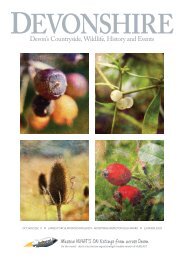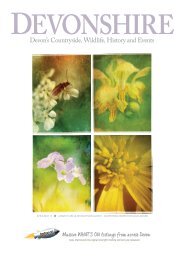Devonshire Feb and Mar 16
Create successful ePaper yourself
Turn your PDF publications into a flip-book with our unique Google optimized e-Paper software.
Horse<br />
Care<br />
Equine Learning<br />
by Natalie Bucklar<br />
Natalie Bucklar gives<br />
valuable advice on<br />
various aspects<br />
of horse care <strong>and</strong><br />
welfare...<br />
Natalie Bucklar<br />
BSc (Hons), MSc (Equine Science)<br />
Natalie has owned horses for<br />
over 20 years <strong>and</strong> owns East<br />
Devon Riding Academy near<br />
Sidmouth. She has previously<br />
lectured in Equine Science to<br />
degree level <strong>and</strong> produced<br />
research for preparing Great<br />
Britains' equestrian teams for<br />
the Olympics. Natalie provides<br />
consultations in all aspects of<br />
Equine Science, <strong>and</strong> has fitted<br />
saddles for competitors at<br />
Badminton International<br />
Horse Trials.<br />
Biting: Part 2<br />
The study of equine behaviour is a<br />
huge subject, this can put people<br />
off learning <strong>and</strong> instead they<br />
reach out for a new supplement<br />
or a magic gadget that they hope<br />
will be a simpler key to rectifying<br />
problems. Although learning a<br />
better underst<strong>and</strong>ing of a horse’s<br />
thinking ability, with a concurrent<br />
commitment to improving<br />
the skill of giving signals <strong>and</strong><br />
reinforcements takes more time<br />
<strong>and</strong> effort, it can reap fantastic<br />
rewards helping a huge number<br />
of common problems people<br />
encounter with their equine<br />
friends.<br />
The way a horse learns is directly<br />
related to survival. Horses are<br />
driven by food, company, shelter<br />
<strong>and</strong> freedom from pain. If they<br />
think they are in danger, they<br />
will remove themselves from<br />
a situation (for example run)<br />
or refuse to get in to one (for<br />
example they won’t load). At East<br />
Devon Riding Academy we teach<br />
children not to run near the horses<br />
by explaining that although we<br />
know there are no tigers living<br />
in Branscombe, if the horses see<br />
them running they might think<br />
that the children are running<br />
from a tiger about to eat them<br />
<strong>and</strong> then they will run too. You<br />
have to think like a horse, if their<br />
herd mates suddenly take off then<br />
they are unlikely to be the one<br />
who st<strong>and</strong>s there waiting for the<br />
tiger. Even though they’ve never<br />
actually seen one, it doesn’t stop<br />
their instinct of thinking they’re<br />
about!<br />
In different situations, horses will<br />
either react to the rider/h<strong>and</strong>ler or<br />
the environment. If a horse is unreactive<br />
to a plastic bag, it is more<br />
under the control of the rider. If a<br />
horse spooks at the plastic bag, at<br />
that moment it is more under the<br />
control of the environment. To get<br />
the horse more under the control<br />
of the rider requires training, not<br />
punishment. If a horse won’t jump<br />
then whipping it will just associate<br />
an already scary object (the jump)<br />
with pain, leading to an even less<br />
likely chance of success. Through<br />
simplifying the problem (the<br />
Want to be notified of new HORSE CARE articles?<br />
Just Like devonshiremagazine.co.uk on Facebook!<br />
jump), giving appropriate signals<br />
that the horse underst<strong>and</strong>s at<br />
an appropriate time <strong>and</strong> taking<br />
the time to practise, you will<br />
have a much happier <strong>and</strong> safer<br />
horse, more compliant with your<br />
wishes. Again, it is important to<br />
think from the horses point of<br />
view. Just because he can jump<br />
a pole at 3 foot doesn’t mean he<br />
will automatically jump a set of<br />
planks or a whole course at this<br />
height if he hasn’t been trained<br />
accordingly.<br />
Horses learn well as a result of<br />
clear, consistent reinforcement<br />
of correct responses. An example<br />
of this is horses in many livery<br />
yards waiting at the gate to go in<br />
a stable each evening. This isn’t<br />
because they want to go in the<br />
stable, it is because every day at<br />
approximately the same time they<br />
are rewarded with something<br />
they want- food, which just<br />
happens to be in the stable. The<br />
owner has (often unwittingly)<br />
trained the horse to wait at the<br />
gate because they have clearly,<br />
consistently reinforced this<br />
behaviour with food.<br />
Horses can learn unwanted<br />
behaviours because they have<br />
somehow been rewarded for the<br />
incorrect response. If a horse gets<br />
through the electric fence <strong>and</strong><br />
receives a reward of more grass<br />
or a friend or freedom, he will<br />
do it again. Turn the electric on<br />
<strong>and</strong> some horses will prefer not<br />
to get the reward so they don’t<br />
get a shock. Others will be so<br />
motivated by the reward they<br />
will work out a way to still get<br />
it, such as jumping the fence or<br />
in the case of one of my horses,<br />
kicking <strong>and</strong> breaking the posts.<br />
Rewards for the horse take many<br />
forms, including removal of pain,<br />
which is worth remembering if<br />
you are having problems when<br />
riding. Stop, think <strong>and</strong> analyse<br />
from the horse’s point of view <strong>and</strong><br />
you will often see the problem<br />
<strong>and</strong> find a solution. Again, simplify<br />
the situation if need be, gain<br />
success then progress upwards.<br />
Simplification could be things like<br />
going slower, making a turn wider,<br />
3 poles instead of 5, 15 minutes<br />
instead of 30, 10 metres instead<br />
of 2 or vice versa.<br />
Alternatively,<br />
unwanted<br />
behaviours can be because the<br />
training has been insufficiently<br />
generalised. An example of this<br />
is a horse that will go through<br />
water at home but not when away<br />
from home because the water is<br />
a different version. In order to get<br />
the horse to go into any water,<br />
training requires exposure to lots<br />
of different water but progressed<br />
in simple steps- start with a<br />
puddle rather than a river!<br />
With many problems, groundwork<br />
can be a great solution or a starting<br />
point to a solution. It is a good skill<br />
worth learning for any rider, as<br />
an underst<strong>and</strong>ing of anatomy,<br />
movement, communication <strong>and</strong><br />
reinforcement learnt through<br />
groundwork translates to many<br />
ridden <strong>and</strong> h<strong>and</strong>ling situations.<br />
Happy riding.<br />
East Devon Riding Academy<br />
Riding lessons for adults <strong>and</strong> children<br />
from 2 years of age.<br />
Pony mornings every week throughout the<br />
school holidays.<br />
We strive to make your hobby safe, fun<br />
<strong>and</strong> educational. Read our excellent<br />
reviews on Trip Advisor & Facebook.<br />
Natalie x<br />
www.ridingacademy.co.uk<br />
Telephone: 07771 903220 ~ Find Us On Facebook<br />
84<br />
Countryside, History, Walks, the Arts, Events & all things Devon at: DEVONSHIRE magazine.co.uk


